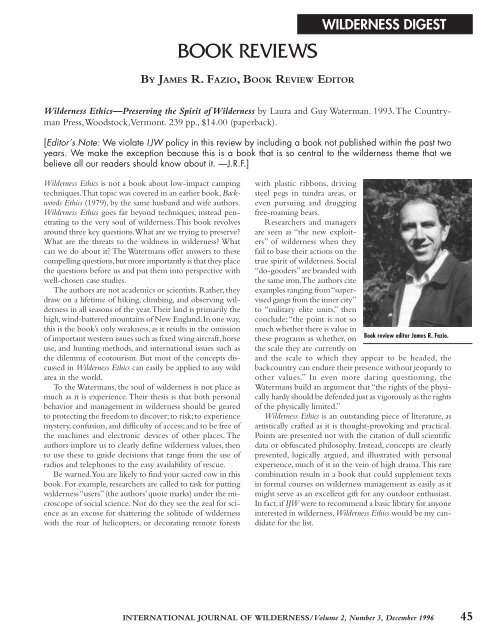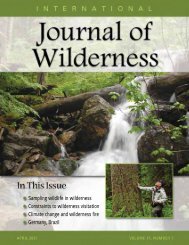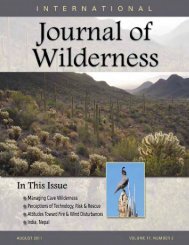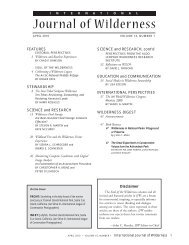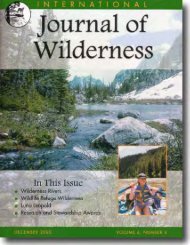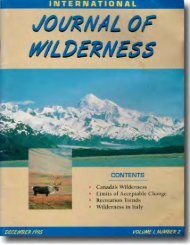P3-Vol 2.No3 Dec 96 - International Journal of Wilderness
P3-Vol 2.No3 Dec 96 - International Journal of Wilderness
P3-Vol 2.No3 Dec 96 - International Journal of Wilderness
Create successful ePaper yourself
Turn your PDF publications into a flip-book with our unique Google optimized e-Paper software.
BOOK REVIEWS<br />
BY JAMES R. FAZIO, BOOK REVIEW EDITOR<br />
<strong>Wilderness</strong> Ethics—Preserving the Spirit <strong>of</strong> <strong>Wilderness</strong> by Laura and Guy Waterman. 1993. The Countryman<br />
Press, Woodstock, Vermont. 239 pp., $14.00 (paperback).<br />
[Editor’s Note: We violate IJW policy in this review by including a book not published within the past two<br />
years. We make the exception because this is a book that is so central to the wilderness theme that we<br />
believe all our readers should know about it. —J.R.F.]<br />
<strong>Wilderness</strong> Ethics is not a book about low-impact camping<br />
techniques. That topic was covered in an earlier book, Backwoods<br />
Ethics (1979), by the same husband and wife authors.<br />
<strong>Wilderness</strong> Ethics goes far beyond techniques, instead penetrating<br />
to the very soul <strong>of</strong> wilderness. This book revolves<br />
around three key questions. What are we trying to preserve?<br />
What are the threats to the wildness in wilderness? What<br />
can we do about it? The Watermans <strong>of</strong>fer answers to these<br />
compelling questions, but more importantly is that they place<br />
the questions before us and put them into perspective with<br />
well-chosen case studies.<br />
The authors are not academics or scientists. Rather, they<br />
draw on a lifetime <strong>of</strong> hiking, climbing, and observing wilderness<br />
in all seasons <strong>of</strong> the year. Their land is primarily the<br />
high, wind-battered mountains <strong>of</strong> New England. In one way,<br />
this is the book’s only weakness, as it results in the omission<br />
<strong>of</strong> important western issues such as fixed wing aircraft, horse<br />
use, and hunting methods, and international issues such as<br />
the dilemma <strong>of</strong> ecotourism. But most <strong>of</strong> the concepts discussed<br />
in <strong>Wilderness</strong> Ethics can easily be applied to any wild<br />
area in the world.<br />
To the Watermans, the soul <strong>of</strong> wilderness is not place as<br />
much as it is experience. Their thesis is that both personal<br />
behavior and management in wilderness should be geared<br />
to protecting the freedom to discover; to risk; to experience<br />
mystery, confusion, and difficulty <strong>of</strong> access; and to be free <strong>of</strong><br />
the machines and electronic devices <strong>of</strong> other places. The<br />
authors implore us to clearly define wilderness values, then<br />
to use these to guide decisions that range from the use <strong>of</strong><br />
radios and telephones to the easy availability <strong>of</strong> rescue.<br />
Be warned. You are likely to find your sacred cow in this<br />
book. For example, researchers are called to task for putting<br />
wilderness “users” (the authors’ quote marks) under the microscope<br />
<strong>of</strong> social science. Nor do they see the zeal for science<br />
as an excuse for shattering the solitude <strong>of</strong> wilderness<br />
with the roar <strong>of</strong> helicopters, or decorating remote forests<br />
with plastic ribbons, driving<br />
steel pegs in tundra areas, or<br />
even pursuing and drugging<br />
free-roaming bears.<br />
Researchers and managers<br />
are seen as “the new exploiters”<br />
<strong>of</strong> wilderness when they<br />
fail to base their actions on the<br />
true spirit <strong>of</strong> wilderness. Social<br />
“do-gooders” are branded with<br />
the same iron. The authors cite<br />
examples ranging from “supervised<br />
gangs from the inner city”<br />
to “military elite units,” then<br />
conclude: “the point is not so<br />
much whether there is value in<br />
these programs as whether, on<br />
the scale they are currently on<br />
WILDERNESS DIGEST<br />
Book review editor James R. Fazio.<br />
and the scale to which they appear to be headed, the<br />
backcountry can endure their presence without jeopardy to<br />
other values.” In even more daring questioning, the<br />
Watermans build an argument that “the rights <strong>of</strong> the physically<br />
hardy should be defended just as vigorously as the rights<br />
<strong>of</strong> the physically limited.”<br />
<strong>Wilderness</strong> Ethics is an outstanding piece <strong>of</strong> literature, as<br />
artistically crafted as it is thought-provoking and practical.<br />
Points are presented not with the citation <strong>of</strong> dull scientific<br />
data or obfuscated philosophy. Instead, concepts are clearly<br />
presented, logically argued, and illustrated with personal<br />
experience, much <strong>of</strong> it in the vein <strong>of</strong> high drama. This rare<br />
combination results in a book that could supplement texts<br />
in formal courses on wilderness management as easily as it<br />
might serve as an excellent gift for any outdoor enthusiast.<br />
In fact, if IJW were to recommend a basic library for anyone<br />
interested in wilderness, <strong>Wilderness</strong> Ethics would be my candidate<br />
for the list.<br />
INTERNATIONAL JOURNAL OF WILDERNESS/<strong>Vol</strong>ume 2, Number 3, <strong>Dec</strong>ember 19<strong>96</strong> 45


